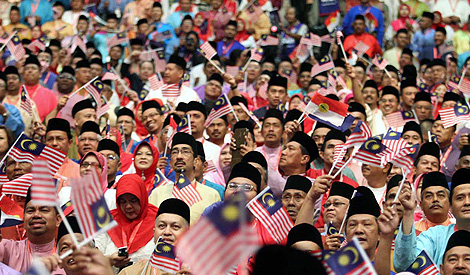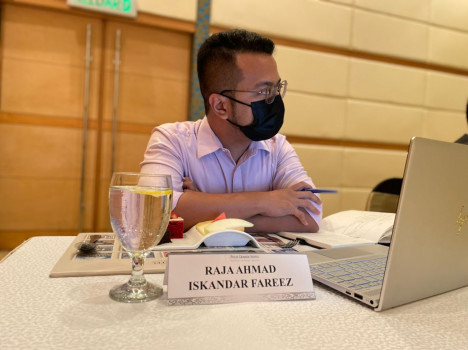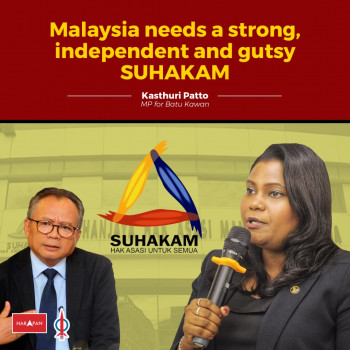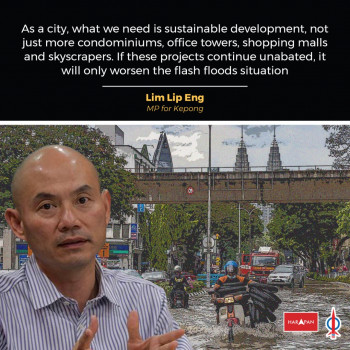On Political realignment, Part 2
BY Liew Chin Tong, DAP Political Education Director and Kluang MP
I would divide the evolution of political Islam in Malaysia into three stages: Islamic revival/resurgent which culminated in changes in UMNO and PAS in 1982, the emergence of PAS’ progressive faction in 1998, and “post-Islamism” of 2015.
I have always been reluctant to draw direct comparison between international trends in the discourse of political Islam and Islamic politics at home, because to a large extent, politics is local. However, international trends and labels are instructive as a window to observe domestic changes.
Of course, this is just my own perspective. In every stage of development of Political Islam, there are counter forces and voices of resistance. One could say that the path of the discourse evolution is not a linear one, but has been a winding journey.
On the international front, the main political struggle within the Muslim fraternity from the early 20th century until about the 1960s was anti-colonialism and anti-Western sentiment. Politics within the Muslim community seemed to revolve around these themes.
Hence, the Islamist movement in those years was often combined with anti-colonialist and left-wing movements in many countries, with very few organisations actually using Islam as the basis for political action – often these organisations were weak.
In Malaysia, the first Islamic political party, Hizbul Muslimin, was founded in 1948 and banned by the colonial government in the same year. It was an offshoot of Parti Kebangsaan Melayu Malaya/ Parti Nasionalis Melayu (PKMM/ MNP). PAS was founded in November 1951 in Butterworth by ex-UMNO clerics. Former Premier Abdullah Ahmad Badawi’s father and grandfather were among the founders of PAS.
In terms of political compass, Hizbul Muslimin was nominally right-leaning while PAS was left-leaning. In 1954, UMNO barred its members from holding dual political party membership, the majority of the original UMNO clerics who had also joined PAS then chose to remain in UMNO. The former President of the banned PKMM/ MNP, Dr.Burhanuddin al-Helmy, became PAS President in 1956.
In the 1959 General Election, PAS won the states of Kelantan and Terengganu. At that time, there was virtually no governing political party under the banner of Islam anywhere in the world other than in Pakistan and Indonesia.
Within PAS, many see the party in the image of Muslim Brotherhood, an organisation that frequently faced government persecution for the most part of the last sixty years. One of Ikhwan’s greatest ideologues, Sayyid Qutb, was accused of plotting the assassination of Gamal Abdel Nasser and was sentenced to death by hanging.
While PAS has been heavily influenced by the way Ikhwan conducts its affairs, in many ways it was the wrong role model to emulate because Ikhwan, as an oppressed movement, focuses on survival while PAS has to win elections.
Resurgence/ revival of Islam
The Islamic resurgence movement, using the slogan “Islam is the solution”, emerged as a global political wave in the 1970s. The Iranian Revolution in 1979 inspired Muslims around the world to put their faith in using radical means to obtain victory.
Malaysian Islamic politics did not develop in a vacuum, it is not immune to international developments. Islamic resurgence in Malaysia took the form of an anti-establishment movement that rose in the 1970s (with Anwar’s ABIM as the main player). Followed by the 1980s which witnessed PAS and UMNO battle to out-Islamise each other.
Few Malaysians received Islamic academic training prior to the 1980s, Anwar’s ABIM could be said to be the cradle for the leaders of that era.
ABIM emerged after the May 13 incident which saw PAS and UMNO officially became allies in 1973 and PAS joining Barisan Nasional in 1974. This union of UMNO and PAS left a political void that allowed the rise of ABIM as a leader in the Islamic-based anti-establishment movement.
In the 1978 election, Anwar campaigned for PAS, but went on to join UMNO a week before the 1982 general election. PAS internal realignment -which saw the ouster of its then President Asri Muda- took place at the Muktamar in October of the same year.
After joining UMNO in 1982, Anwar strongly pushed for issues with “Islamic branding” such as an Islamic University, Islamic finance, Islamic banking system, etc. Anwar’s strategy was (a) to push for the promotion of Islamic labels that were acceptable within the broader capitalist framework; (b) to create a brand of Islam that was acceptable under the multi-racial framework of BN.
On the other hand, the then newly-minted Vice President of PAS Hadi Awang pushed for a more “pure, true Islam” in competition with Anwar’s group. The controversial “Amanat Hadi” – first delivered in 1981- called out UMNO leaders and members as Muslims who were not sincere in the struggle for Islam, therefore falling within the category of kafir (infidel).
This declaration ignited social unease, particularly in Hadi’s home state of Terengganu. Many Muslim PAS members severed ties with their UMNO brethren, some even went to the extent of performing Muslim prayer rites twice during weddings and funerals (once by a PAS Imam and once by an UMNO imam).
By far the most dramatic crisis between PAS and the UMNO-led state apparatus was the Memali incident in 1985 which saw a police seige and deadly clash with PAS members in a small religious sect in Kedah.
In the 1986 election, PAS contested in 90 out of 154 Parliamentary seats, thinking that the strong tide of Islamic sentiment would allow it to win power. However, PAS only managed to win one seat, the hardliners within the party declined in strength while the moderates rose to prominence as a result.
Following the bitter defeat of 1986, the moderates gained ground within PAS, led by the newly elected (in 1989) party president Fadzil Noor. PAS worked with Semangat 46 after the 1987 UMNO split and went on to win back the state government of Kelantan in 1990.
Progressives/ Moderates
The global Islamic resurgence inspired by the Iranian Revolution did not last long. By the 1990s, the Islamic movement in many countries experienced failed experiments in democracy (Algeria, Tunisia). It was an era of hardship, but also an era where political Islam experienced greater diversity.
After the 1989 collapse of the Soviet Union and Eastern European Communist bloc, Western theorists (in particular, American political scientists such as Samuel P. Huntington) were in search of a new political “enemy”. The latter’s thesis “The Clash of Civilisations” became the canon for the school of thought that placed Islam as the new political enemy.
The 2001 Al-Qaeda (Osama bin Laden) attack on the World Trade Center was a product of radicalised Islam under siege. The counter trend was the tendency for Islamic parties such as in Indonesia and Turkey which had tasted power, to then move towards the center in a bid to woo moderate voters.
There were serious efforts to argue and showcase that Islam is compatible with democracy.
After the radical days of Malaysian political Islam in the 1980s, PAS’ 1990 Kelantan victory attracted some talent to join the party which later steered the party towards the middle. However, PAS’ success in 1990 in some ways also contributed to its poor performance in 1995.
The Anwar incident in 1998 garnered PAS more mass support, members, and leaders. Many non-religious technocrats and professionals were drawn to join PAS during the Reformasi movement, some even became full time political workers and leaders.
When Fadzil Noor passed away in 2002, the new President Hadi Awang abandoned the democratic Islamic campaign and revived radicalism via Haron Din’s November 2003 Islamic State Document, leading to the party’s 2004 massive electoral defeat.
In the wake of the 2004 defeat, Hadi allowed the progressives within the party to promote their political agenda to soften PAS’ image. Boosted by the informal political cooperation with PKR and DAP, PAS made unprecedented electoral gains in the 2008 general election.
Post-Islamist
The global Islamic political movement entered a period of reflection after the setbacks experienced after the 2011 Arab Spring. The Islamic political parties and movements had not anticipated the emergence of the Arab Spring uprising and arguably responded to it quite poorly.
In the post-Arab Spring process of democratisation, Islamic political parties became the most organised societal force apart from the army, these parties made significant electoral gains in Egpyt and Tunisia.
However, President Morsi’s administration crumbled within a year, it lacked capable leaders to manage transition from authoritarian society after decades of persecution extinguished its pool of leaders with technocratic background. After coming into power, it was powerless against the retaliation of the Deep State and failed to solve Egypt’s economic woes.
The Tunisian Islamic political party, Ennahda, was perhaps the most prepared in the spirit of democracy to concede administrative power and allow a technocratic government to rule.
Turkey’s Erdogan who came to power in 2003 was the original symbol of Islam’s democratisation, but after being in power for too long he became a soft dictator of sort.
The challenge faced by political Islam is the vagueness of the slogan “Islam is the solution” in addressing the actual economic, administrative and governance problems. Is Islam a “magic pill” for everything?
Or is it time for the broader principles of Islam, maqashid syariah, be promoted to replace the superficial use of Islamic labels?
The dramatic break-up of PAS in 2015 is a product of the clash between the 1982 Islamic resurgence faction and the 1998 progressive/ moderate faction. In fact there is another level of conflict: how to promote Islam in a post-Islamism scenario.
Take hudud as an example. During dialogue with students of Islamic studies, I will inevitably be asked about my views on hudud.
My reply was this: establishing Islamic finance mechanism was an important “product” of the 1982 UMNO brand of Islam. During the 1980s Islamic resurgence, there was very little serious research on Islam and not many Malaysians who studied Islam seriously. People were satisfied with any “products” offered under “Islamic branding”. The bar was very low.
In 2015, there are at least tens of thousands if not hundreds of thousands of Malaysians researching Islam seriously. As a society, we have a more profound understanding of the religion compared to 1982.
Islamic finance and Islamic bonds, sukuk, are both well-intentioned financial instruments packaged as “Islamic”. If today, the Malaysian government chooses to issue sukuk to bail out 1MDB, is this halal (permitted) or haram (forbidden)? Usually more than half of my Muslim audience will say that it is haram.
In the same vein, discussion of hudud in the 1980s did not involve that much of detailed contents of the laws, or giving room for debate. In 2015, with so many Malaysians spending years studying Islam, more would be conscious of the fact that if we do not apply ijtihad, we are likely to amputate the hand of someone who stole RM42 while allowing a thief who stole RM42 billion to get off scot free. Such outcome would not fulfill the broader concept of Islamic justice.
The progressives/ moderates attempted to face a pluralistic society within the framework of the Islamic resurgence. The challenge of the 1980s was to promote Islamic labelled way of thinking within a society that was not quite “Islamised”. For instance, Islamic lifestyle (tudung), politics, economy (Islamic finance), and law (hudud) were all very novel then.
The Class of 1998 tried to break the mould of the Class of 1982. The challenge in 2015 is how to move forward in a society that are ready for more than just superficially “Islamised” labels, going beyond symbolism to address broader question of justice guided by Islam and to deal with bread and butter issues.
After the 2015 split, Hadi’s PAS is left with the discourse of 1982 Islamic resurgence. Amanah must not only fulfill the mandate of the progressives/ moderates, it must propose a comprehensive post-Islamist discourse on maqashid syariah in order to win the support of more Malaysians for a just society.
The evolution of discourse in political Islam plays a pivotal role in the realignment of the Malaysian political spectrum.
– The Rocket




